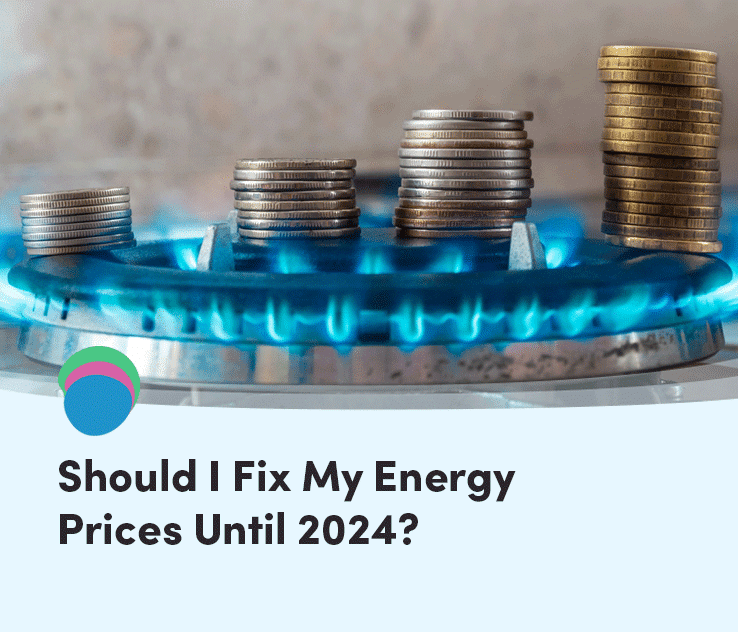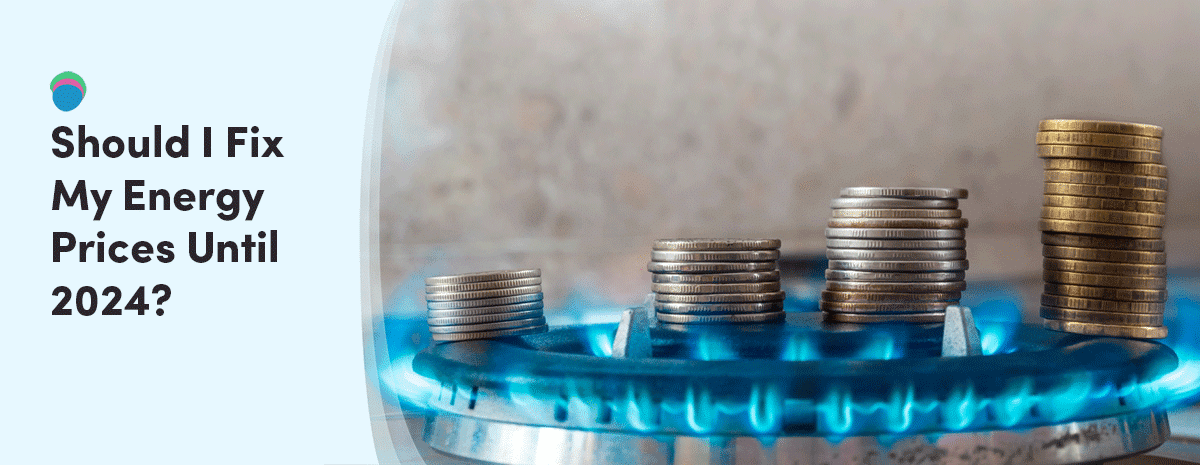Should I Fix My Energy Prices Until 2024?
If you value predictable energy bills, then it could be advisable to consider securing your energy rates until 2024. Research from Cornwall Insight anticipates a rise in energy prices by early 2024.
Given Ofgem’s price cap set at £1,834 until 2024, there are more economical fixed-rate options available. When deciding, evaluate the contract term, potential savings, and the price consistency it provides.
Let’s look into this more, covering both home and business energy.

Article Contents
When is a good time to fix your business energy deal?
To make the most informed choice, businesses should first look at the current business electricity rates and business gas prices.
Our business energy comparison tool is here to help. It lets you see the top deals from our selected energy providers.
Sticking with standard business energy tariffs may lead to higher costs. By comparing and then fixing their energy prices until 2024, many businesses could see significant savings.
Should I fix my home energy tariff until 2024?
Fixing your home energy prices until 2024 is beneficial if you can secure a tariff that’s below the current £1,923 price cap.
By October 2023, few suppliers have tariffs just below this cap. We anticipate more competitive deals by late 2023.
Why should I consider fixing my energy prices until 2024?
Fixing your energy prices until 2024 provides stability against unpredictable market fluctuations and potential price hikes. Here’s a deeper look into the reasons:
- Peace of Mind: With a fixed tariff, you’re shielded from sudden increases in energy costs
- Combat Volatile Prices: The energy market can be volatile. A fixed-rate ensures you’re not affected by these changes.
- Budgeting: By knowing your energy expenses for the next year, you can plan and budget more effectively.
- Competitive Rates: Some energy suppliers offer fixed tariffs at rates that are competitive, often below prevailing price caps.
Given these benefits, it’s worth considering a fixed energy tariff as we approach 2024.
What assistance will be available to help with energy bills in 2024?
In 2024, help with high energy bills will primarily be available through two schemes: the Energy Price Cap for households and the Energy Bill Discount Scheme for businesses.
For households, the Energy Price Cap is set at £1,923 until December 2023, ensuring that variable tariff charges do not exceed this amount, offering protection against unexpected price surges.
Businesses, on the other hand, can benefit from the Energy Bill Discount Scheme. While there’s no specific cap for businesses, this scheme provides support when wholesale electricity rates surpass 30.2p/kWh or gas prices exceed 10.7p/kWh.
Related Read: Energy Bill Discount Scheme
What is predicted to happen to energy prices in 2024?
Energy prices in 2024 are predicted to experience a gradual decline from the high rates observed in the previous year.
Diving deeper into the details:
- The trend indicates a stabilisation of energy prices, with a potential for them to decrease incrementally over the upcoming months.
- The energy price cap for households is set at £1,923 until December 2023, acting as a ceiling for variable tariff charges.
- While there isn’t a specific cap for businesses, the Energy Bill Discount Scheme offers support when wholesale electricity rates go beyond 30.2p/kWh or gas prices exceed 10.7p/kWh.
- Notably, predictions from Cornwall Insight suggest that the price cap will see a drop to £1,819.60 from April 2024, but higher prices than current levels might persist until July 2024. By October 2024, the forecasted average bill is expected to be around £1,825 annually.
For those looking to compare home energy options, we provide a comprehensive energy comparison platform. For businesses aiming to find the most competitive energy deals, exploring our business energy supplier comparison service is a recommended step
Should I act now and renew my business energy contract?
Yes, it’s advisable to act now and renew your business energy contract.
Given the current energy landscape, businesses are facing potential price fluctuations and uncertainties in 2024. Renewing your contract now can offer several benefits:
- Protection Against Volatility: With the threat of colder weather and potential price hikes, securing a fixed contract can shield your business from unpredictable energy costs.
- Cost Savings: As energy prices continue to rise, locking in a favourable rate now can lead to significant savings in the long run.
- Informed Decision Making: Contracts due for renewal in 2024 give businesses the opportunity to review and compare the best deals available, ensuring optimal energy procurement.
Renewing your business energy contract now can yield notable financial gains and establish certainty as 2024 approaches.
What is the energy price cap and how does it affect homeowners and businesses?
The energy price cap is a limit set on the price per kWh that home energy suppliers can charge on their default standard variable tariffs, ensuring homeowners are protected from excessive energy charges.
Here’s a more detailed breakdown:
- Components of the Cap: The cap includes both the standing charge and the price per kWh. However, the overall cost of your bill isn’t capped. Your monthly bill is determined by your energy consumption. The more energy you use, the higher your bill will be, even with capped rates.
- Exclusions: The price cap doesn’t apply to everyone. If you’re on a standard variable green energy tariff or have already opted for a fixed-term energy tariff, the cap won’t affect you.
- Updates to the Cap: Ofgem, the energy regulator, will now update the cap quarterly, rather than every six months. This means more frequent adjustments in line with market conditions.
For homeowners, the cap serves as a protective measure against unreasonable price hikes. Businesses, on the other hand, should familiarise themselves with the Energy Bill Discount Scheme to navigate the energy market effectively.
Why are energy prices still so high?
Energy prices remain high primarily because, despite wholesale prices dropping month on month, they are still double the historical average.
Let’s take a deeper look into why:
- Wholesale Price Dynamics: While there’s a noticeable decline in wholesale prices, they’re still considerably higher than what was historically observed. This means that even with the reductions, the prices are still elevated compared to past averages.
- Supply and Demand: Various global factors, including geopolitical tensions, supply chain disruptions, and increased demand, have contributed to the surge in energy prices over the past years. Even as these factors stabilise, the residual effects keep prices high.
- Energy Price Cap: The energy price cap, which limits the maximum that can be charged on a variable tariff, provides some protection for homeowners. However, the cap itself is influenced by the wholesale market, and as such, it has risen in response to the higher wholesale costs.
- Other Factors: External influences, such as global economic recovery post-pandemic and increased demand for energy, also play a role in keeping prices elevated.
Are energy prices expected to drop in 2024?
Yes, energy prices are expected to drop in 2024.
The energy price cap, which is a limit on the price per kWh for home energy suppliers’ default standard variable tariffs, will decrease from October to mirror the declining wholesale energy prices. Specifically, Energy analysts Cornwall Insight have projected the following changes to the energy price cap:
| Period | Price Cap |
|---|---|
| October to December 2023 | £1,923 |
| January to March 2024 | £1,898 |
| April to June 2024 | £1,820 |
This cap is influenced by the costs energy suppliers are anticipated to face when purchasing electricity and gas on the wholesale markets. It’s worth noting that while the cap is set to decrease, the overall cost of energy bills will still depend on individual consumption.
Furthermore, market analysts predict a continued gradual decrease in energy prices throughout the remainder of 2023 and into 2024. This trend is a positive sign for both homeowners and businesses, suggesting more manageable energy costs in the near future.
Frequently Asked Questions (FAQs)
Is help available for households struggling with energy price increases?
Yes, there is help available for households struggling with energy price increases.
For households facing challenges with rising energy costs, the UK government and various organisations offer the following help:
- Energy Bill Support Scheme: This scheme provided a £400 discount on energy bills for the winter of 2022 to 2023, although it ended in March 2023.
- Cost of Living Payment: Eligible households can receive an annual one-off payment ranging from £100 to £300. For the year 2023-24, there’s an additional £300 top-up to aid with the cost of living.
- Energy Price Cap: This cap limits the price per kWh home energy suppliers can charge on their default standard variable tariffs, offering protection against sudden price surges.
- Advice and Guidance: Organisations like Citizens Advice and Age UK provide information and support to households on managing energy costs and accessing available assistance.
Staying informed about these support measures can help households navigate and mitigate the impact of rising energy prices.
What help is available to businesses struggling to pay their energy bills?
Yes, businesses struggling to pay their energy bills can access support measures.
For businesses grappling with rising energy costs, there are specific schemes and initiatives in place:
- Energy Bill Discount Scheme: This scheme is available from 1 April 2023 to 31 March 2024. It offers discounts to businesses on their energy bills. Notably, businesses don’t need to apply for this scheme; if eligible, the discount will be automatically applied to their bills. However, it’s worth noting that the assistance provided by this scheme will be less than what was available before April 2023.
- Local Council Support: Some local councils offer small business support funding, which can include grants aimed at sustainable business growth.
- GOV.UK Business Finance and Support Finder: This tool can help businesses identify additional financial support and schemes that they might be eligible for.
- Advice and Guidance: Organizations like Citizens Advice offer information and support to businesses on managing energy costs and accessing available assistance.
In light of the current energy market challenges, businesses are encouraged to explore these support measures and stay informed about any new initiatives or changes that might be introduced.
What should I do if my fixed rate tariff is due to expire?
If your fixed rate tariff is due to expire, it’s essential to evaluate the available options.
Once your fixed tariff ends, your energy supplier will automatically shift you to a standard variable tariff. This default variable tariff is price-capped, which means there’s a limit to how much you can be charged per kWh. Interestingly, this capped rate might be more economical than many new fixed tariffs.
However, it’s always a good strategy to compare the market. By doing so, you can determine if there are any fixed tariffs that are more affordable than the default variable rate. If you find that no fixed tariffs are competitively priced, it might be wise to remain on the default tariff, especially if prices are expected to decrease below the cap in the near future.
In essence, while the energy landscape can be unpredictable, being proactive and informed about your tariff choices can ensure you get the best deal for your circumstances.

Chris Richards
Chris is a personal finance specialist who founded Council Tax Advisors in 2012, assisting over 250,000 people with their Council Tax debt. Observing that many clients overpaid on utilities, he launched Utility Saving Expert in 2014, an energy price comparison site. In 2016, the platform expanded its services to include consumer and business insurance comparisons. Utility Saving Expert stands out with its commitment to social responsibility, donating 10% of net profits to fuel poverty charities, underscoring its dedication to both client value and community support.
